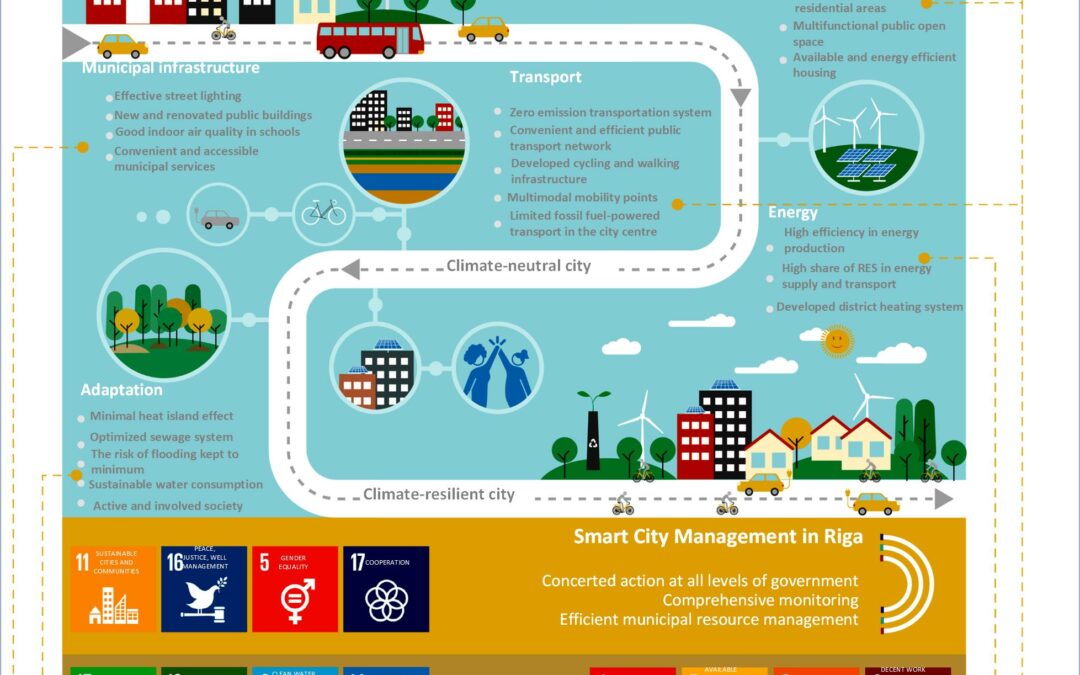Fellow City Riga is Laying a Roadmap for Climate Leadership
Climate change is one of the biggest challenges of our time for all levels of policymaking. At the municipal level, smart energy transition actions go far beyond implementing single projects. Decarbonising a city involves a complex strategic planning and requires a system thinking. With this in mind, the City of Riga concludes the elaboration of the “Riga Sustainable Energy and Climate Action Plan 2022-2030” (further – Riga SECAP-2030), an ambitious, goal-oriented, integrated policy framework for a smart urban decarbonisation transition, inspired by the “Cities4ZERO” methodology, developed within SmartEnCity project and applied in ATELIER. It depicts a strategic, participatory and multi-sectorial energy planning approach based on a long-term system thinking, bringing stakeholders together to achieve a common vision for future urban decarbonisation strategies, mutually agreed targets, priority areas and appropriate measures.
Such an approach seeks the commitment of key local stakeholders within the development of an effective transition–foresight framework. It can only be accomplished in a joint effort by building common vision, creating a consensus, mobilising joint actions, shaping the city’s development path as well as promoting a sense of ownership and commitment among the involved stakeholders towards the achievement of the common goals.”
To achieve the vision – Riga: Climate-Neutral City by 2050 – the Riga City Municipality has committed to becoming a climate neutral municipality already by 2030, ensuring that municipal institutions are as sustainable as possible with the least impact on the climate and municipal infrastructure and being resilient to the risks caused by climate change.
The key goals of Riga SECAP-2030 have been set, following the EU and National energy and climate objectives. Specific goals of Riga SECAP-2030 are related to the vision of a climate-neutral and resilient municipality already by 2030 and include the following measurable targets to be achieved by 2030:
- Climate-neutral municipal buildings using 100% RES as the heat energy source;
- Decrease of energy consumption in municipal buildings – 20% reduction compared to 2020;
- Decrease energy consumption in centralised district heating – 20% reduction compared to 2020;
- Comprehensive energy renovation of multi-apartment residential housing – 2.000 buildings refurbished;
- Climate-neutral municipal lighting and traffic lights infrastructure using 100% RES;
- Climate-neutral municipal transportation fleet: zero-emission vehicles using 100% RES, and other targets.
Moreover, the vision of a climate-neutral and resilient municipality includes such goals as a gradual shift from private cars to more sustainable transport modes, significant improvements in the field of waste management, ensuring sustainability of city’s nature capital, achieving better environmental quality, shift to circular economy model, and many other.
The overall CO2 reduction target for the city of Riga by 2030 – 25% reduction compared to 2019 (the last full year before the pandemic) – can only be achieved by an efficient cross-sectoral collaboration and deployment of cross-sectorial innovations in all related areas, from energy production, distribution and efficient use, clean and sustainable mobility, smart and climate-neutral buildings, circularity in all sectors of economy, to education and behavioural change of each citizen, as climate-neutral cities are made by responsible residents.
Currently the new “Riga Sustainable Energy and Climate Action Plan 2022-2030” is one of the most discussed energy and climate action plans in Latvia. During its development, the Smart City Planning Group established within ATELIER conducted 18 working groups in smaller and larger formations, involving more than 280 specialists of various fields representing municipal departments and municipal services providers, academia, research, advisory and other experts, associations, NGO’s and active civil society.
Nika Kotoviča, ATELIER Fellow City Riga Project Coordinator & Urban Planning Expert, City of Riga
Graphic: Riga’s path to a climate-neutral municipality . Credits: City of Riga
Joint approach for SECAP Development in Fellow City Budapest
Not only Riga but also Budapest has recognised the high importance of reacting to the climate change and is taking great efforts in developing a strategic plan involving all kinds of stakeholders, in particular citizens. In this context, one of the most important elements of the creation of the Climate Strategy and SECAP for Budapest was the citizen’s assembly:
“There is a climate emergency! What should Budapest do?” These were the focus issues on the citizens’ assembly organised by the Municipality of Budapest and Demnet in September 2020. The participants were asked to present their ideas and visions. The Citizens’ Assembly or Citizens’ Jury is an internationally applied technique representing living democracy in which the “jury” is consisting of average people representing the population. They were asked to give their opinion on an issue which usually only a circle of politicians and experts can express a position about.
The nearly 50 Budapest citizens who finally attended the citizens’ assembly were randomly selected from 10.000 citizens addressed. The participants represented the composition of the population of Budapest in terms of sex, education and age. The applicants committed themselves to listen to various positions in an open-minded manner, to discuss them and formulate opinions and suggestions concerning the implications of a climate change for Budapest at two weekends in September 2020.
At the first weekend, the participants were listening to various presentations of experts about climate emergency. Subsequently, the participants were given the opportunity to ask questions and discussed the facts that they have heard at round tables with the help of moderators. At the second weekend of the citizens’ assembly, attendants sat together and formulated recommendations as to what the Municipality should do to mitigate climate change. These proposals were included in the strategy and the SECAP of the City of Budapest.
